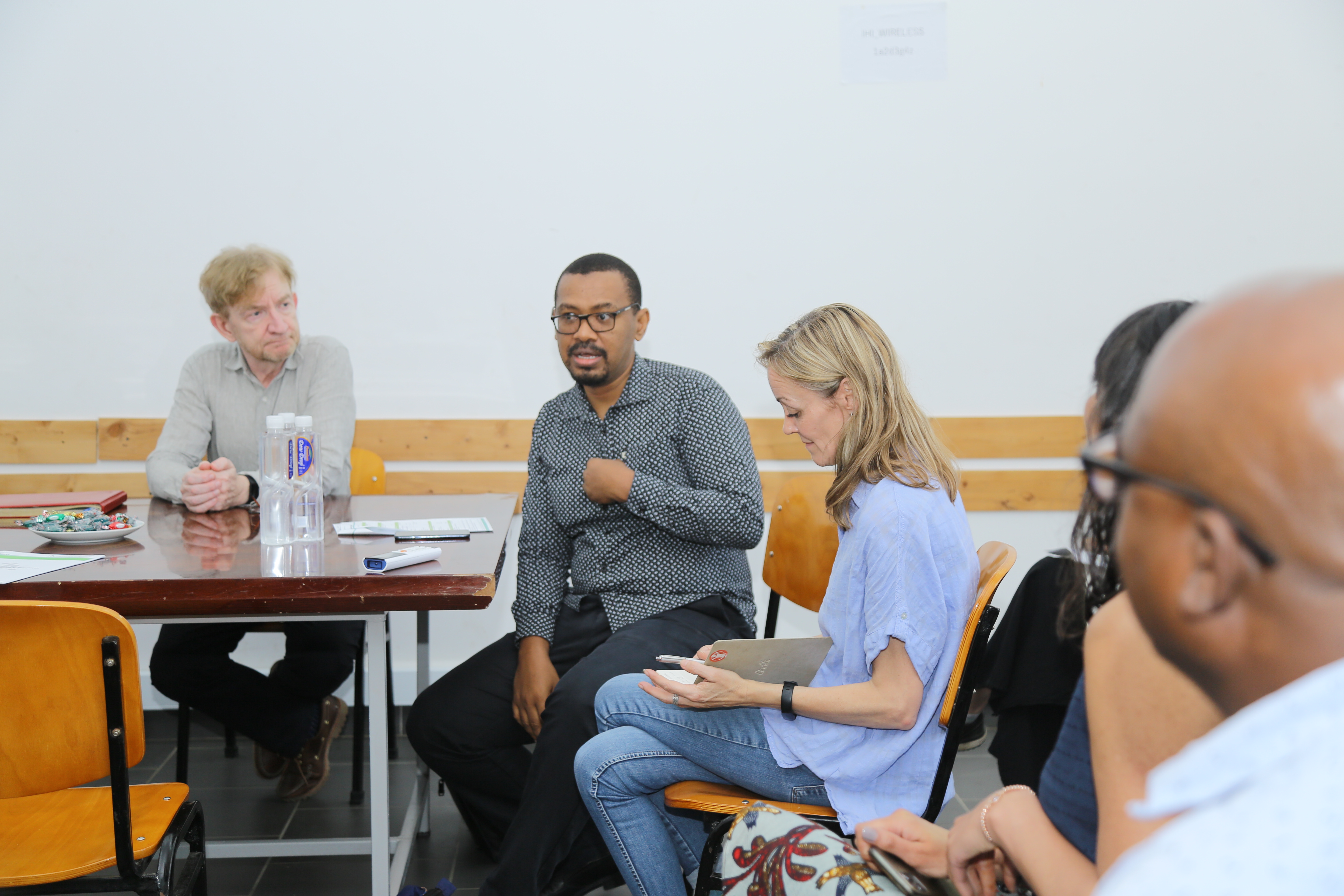
TOUR: Ifakara hosts Oxford's top malaria vaccine scientist, Times journalist in Bagamoyo

For two days - April 11 & 12, 2022 - Ifakara Health Institute hosted a team of scientists, researchers and journalists from the UK’s Oxford University, Malaria No More and The Times newspaper at the Institute’s Bagamoyo office and research platforms.
The trip was an opportunity for Ifakara to showcase progress made in the ongoing R21 malaria vaccine trial being conducted within the Interventions & Clinical Trials unit. The trip also allowed the visitors to speak with the trial teams at respective study sites in Bagamoyo and record/film some proceedings of the trial.
On day one, the team visited Ifakara’s branch office in Bagamoyo where they were officially welcomed by Ifakara’s Chief Executive Director Dr. Honorati Masanja, Head of Bagamoyo Clinical Trials Facility Dr. Florence Milando and Head of Interventions & Clinical Trials unit Dr. Ally Olotu.
During a brief meeting at the facility, Dr. Masanja expressed his hopes for “finding better vaccines that will eliminate malaria completely” while also commending the steps made towards malaria vaccine developments.
From the UK team was Prof. Adrian Hill and Dr. Mehreen Datoo both from the University of Oxford. Prof. Hill is the Chief Investigator of the R21/Matrix-M Multi-Center trial and a braidchild behind the vaccine. He briefly explained to the team about the R21 project and expected outcomes.
Others on the team include Emma Pomfret and Michael Hamilton both from Malaria No More UK; Jane Flanagan, The Times journalist from UK; Joshua Kioko, Eugene Masungu and Brent Owuor all from Kenya.
The team was given a tour of the BRTC by Dr Olutu and introduced to a set of staff who work in various units at the Centre including the Interventions & Clinical Trial Department where the R21 malaria vaccine trial is being studied.
The team then visited the trial site in Kiwangwa ward, Bagamayo District, one of the two study sites where the R21 malaria vaccine is being implemented by Ifakara. The study which is currently in its multi-centre phase III trial, is evaluating the efficacy of the R21/Matrix vaccine in children aged 5-36 months at Kiwangwa dispensary.
Upon arrival at the dispensary, the team met with parents and their children who are participants in the clinical trial at the dispensary. A total of 600 participants children have participated in the clinical trial which is expected to last two years – with the first participant receiving their first vaccine dose in October 2021. The clinical trial is expected to end in 2023 after completion of the four-dose vaccine intake.
Commenting about the clinical trial, the study clinician at Kiwangwa dispensary, Dr. Nsajigwa Misidai said “Despite the initial resistance we faced earlier on during our study due to misconceptions in the community about the vaccine, there has been massive positive feedback leading up to today where the hospital has now exceeded the number of required participants with more still interested to be recruited to be part of the study trial.”
On the government side, the Chairman of Mbwela neighbourhood located in Kiwangwa ward, Mr Kaisa Kuladi applauded the R21 malaria vaccine project and expressed his hope for better results that will prevent the local community from malaria and especially reduce malaria caused deaths among children under the age of three and four years.
To wrap up the trip, on day two the team visited research facilities in Bagamoyo starting with a tour of the IHI Bagamoyo Lab which is the main lab within the Bagamoyo District Hospital. The lab tour was hosted by the Lab Manager, Sarah Mswata who showed the team various sections including the Haematology and Biochemistry section, the Parasitology section and the freeze room. Lastly, the team also got an opportunity to tour the Clinical Trials Facility in at the BRTC in Kingani.
About the R21 Malaria Vaccine
R21/Matrix-M is the second malaria vaccine candidate ever to start a phase III licensure trial. The R21 malaria vaccine was designed at the Jenner Institute, University of Oxford, who have partnered with the Serum Institute of India for commercial development.
Phase III trial builds on the findings of high-level efficacy of 77% in a phase IIb trial in children in Burkina Faso that was published last year in The Lancet. This level of efficacy surpassed the WHO Malaria Vaccine Technology Roadmap objective of developing malaria vaccines with protective efficacy of at least 75 percent against clinical malaria.
The current ongoing multi-center phase III trial is evaluating the efficacy of the R21/Matrix vaccine in children aged 5-36 months from Tanzania, Mali, Burkina Faso, and Kenya. The study in Tanzania is conducted by Ifakara Health Institute with two study sites at Miono and Kiwangwa in Bagamoyo District, Tanzania.
View more photos here.
